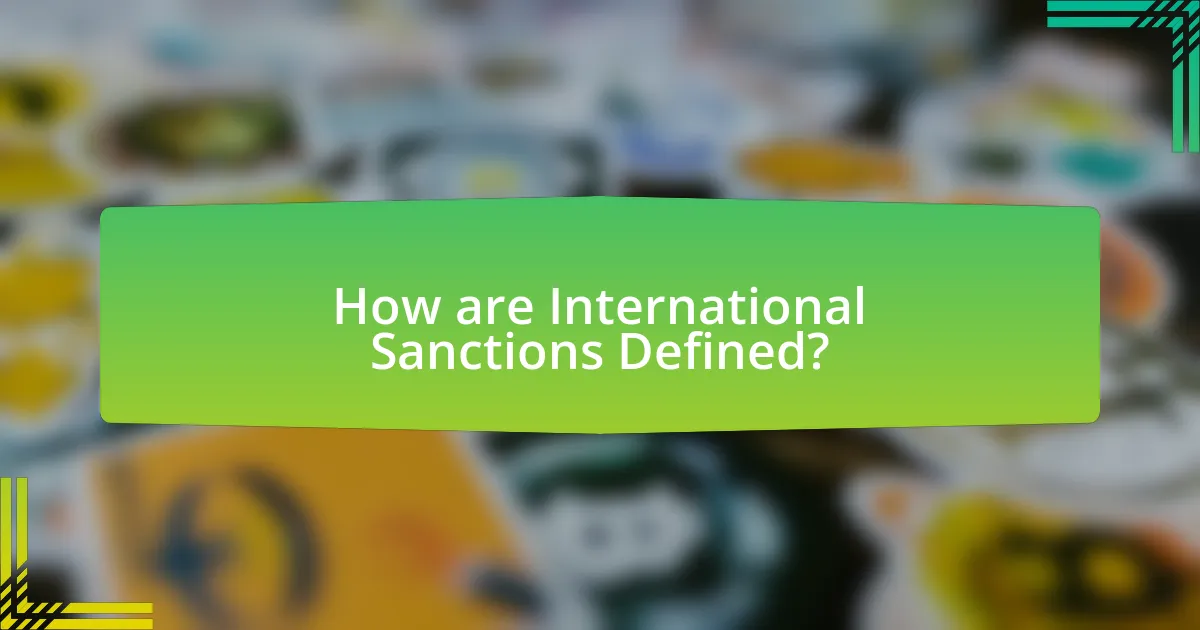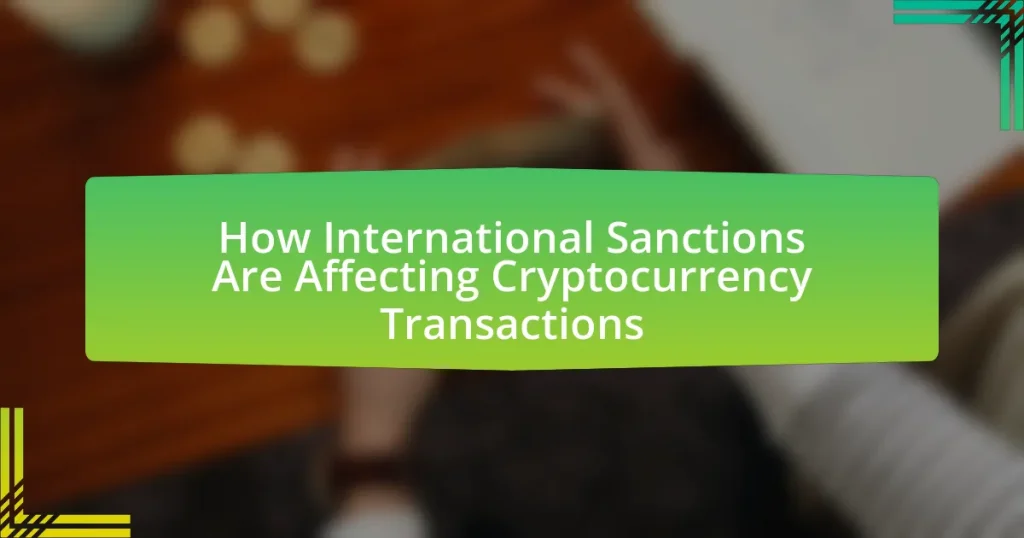International sanctions are restrictive measures imposed by countries or organizations to influence the behavior of targeted states, entities, or individuals, encompassing economic, diplomatic, and military sanctions. This article examines the various types of sanctions, their implications on state behavior, and the significant consequences for economies and global trade. It highlights the relationship between sanctions and cryptocurrency, detailing how sanctions drive the use of digital currencies for evasion and the challenges faced by cryptocurrency exchanges in compliance with international regulations. Additionally, the article explores future implications of sanctions on cryptocurrency transactions and strategies for individuals and businesses to navigate this complex landscape effectively.

How are International Sanctions Defined?
International sanctions are defined as restrictive measures imposed by countries or international organizations to influence the behavior of a target state, entity, or individual. These measures can include trade restrictions, asset freezes, travel bans, and other economic penalties aimed at achieving foreign policy objectives or maintaining international peace and security. For example, the United Nations Security Council can impose sanctions to address threats to peace, as seen in the sanctions against North Korea due to its nuclear weapons program.
What types of international sanctions exist?
International sanctions primarily fall into three categories: economic sanctions, diplomatic sanctions, and military sanctions. Economic sanctions involve restrictions on trade, investment, and financial transactions, often targeting specific sectors or entities within a country. Diplomatic sanctions include the reduction or severance of diplomatic ties, such as expelling diplomats or limiting diplomatic engagements. Military sanctions typically involve arms embargoes or restrictions on military cooperation. These types of sanctions are implemented by countries or international organizations to influence the behavior of nations or entities that violate international laws or norms.
How do economic sanctions differ from diplomatic sanctions?
Economic sanctions involve restrictions on trade, financial transactions, and economic activities to influence a country’s behavior, while diplomatic sanctions focus on reducing or severing diplomatic relations, such as expelling diplomats or limiting official communications. Economic sanctions aim to exert financial pressure, as seen in the U.S. sanctions against Iran, which targeted its oil exports and banking sector, whereas diplomatic sanctions, like the expulsion of Russian diplomats by various countries in response to geopolitical actions, aim to signal disapproval without direct economic impact.
What are the implications of military sanctions?
Military sanctions primarily aim to restrict a nation’s ability to engage in military activities, which can lead to significant geopolitical and economic consequences. These sanctions often result in diminished military capabilities, as targeted nations face limitations on acquiring weapons, technology, and military supplies. For instance, the United Nations imposed military sanctions on North Korea, which have severely impacted its arms trade and military development. Additionally, military sanctions can lead to increased isolation of the targeted nation, fostering a reliance on alternative markets, including illicit channels, which may involve cryptocurrency transactions as a means to bypass traditional financial systems. This shift can complicate international efforts to monitor and control military activities, as cryptocurrencies provide anonymity and ease of transfer across borders.
Why are international sanctions imposed?
International sanctions are imposed to influence a country’s behavior, typically in response to violations of international law or human rights abuses. These measures aim to compel governments to change policies or actions deemed unacceptable by the international community, such as aggression, terrorism, or nuclear proliferation. For instance, the United Nations has imposed sanctions on North Korea to deter its nuclear weapons program, demonstrating how sanctions serve as a tool for global governance and security.
What role do sanctions play in international relations?
Sanctions serve as a tool in international relations to exert pressure on countries or entities to change specific behaviors or policies. They can be economic, diplomatic, or military in nature, and are often employed to address issues such as human rights violations, nuclear proliferation, or aggression against other states. For instance, the United States has imposed sanctions on countries like Iran and North Korea to deter their nuclear programs and influence their geopolitical actions. These measures can isolate the targeted nation economically and politically, thereby aiming to compel compliance with international norms or agreements.
How do sanctions aim to influence state behavior?
Sanctions aim to influence state behavior by imposing economic and political restrictions that create incentives for compliance with international norms. These measures can include trade embargoes, asset freezes, and restrictions on financial transactions, which collectively pressure targeted states to alter their actions or policies. For example, the United States imposed sanctions on Iran to deter its nuclear program, resulting in significant economic hardship that prompted negotiations leading to the Joint Comprehensive Plan of Action in 2015. Such historical instances demonstrate that sanctions can effectively alter state behavior by leveraging economic consequences to encourage adherence to international standards.
What are the consequences of international sanctions?
International sanctions lead to significant economic and political consequences for targeted nations. Economically, sanctions can restrict access to international markets, limit foreign investment, and cause inflation, as seen in countries like Iran and Venezuela, where sanctions have severely impacted their economies. Politically, sanctions can isolate nations diplomatically, reducing their influence and ability to engage in international negotiations, as evidenced by North Korea’s ongoing isolation due to sanctions related to its nuclear program. These consequences can also drive affected nations to seek alternative financial systems, including cryptocurrencies, to circumvent traditional banking restrictions.
How do sanctions affect the economies of targeted countries?
Sanctions negatively impact the economies of targeted countries by restricting trade, limiting access to financial markets, and reducing foreign investment. For instance, countries like Iran and North Korea have experienced significant economic downturns due to sanctions that hinder their ability to export oil and engage in international banking. According to a study by the National Bureau of Economic Research, sanctions can lead to a decrease in GDP by as much as 5% annually for affected nations. Additionally, sanctions often result in inflation and currency devaluation, further destabilizing the economy and leading to increased poverty and unemployment rates.
What impact do sanctions have on global trade?
Sanctions significantly disrupt global trade by restricting the flow of goods, services, and capital between countries. These measures often lead to decreased trade volumes, increased costs for businesses, and the re-routing of trade to circumvent restrictions. For instance, the U.S. sanctions on Iran resulted in a 50% drop in its oil exports from 2018 to 2019, demonstrating how sanctions can directly impact a nation’s trade capabilities. Additionally, countries targeted by sanctions may seek alternative trading partners, which can alter global supply chains and trade dynamics.

How do International Sanctions Impact Cryptocurrency Transactions?
International sanctions significantly restrict cryptocurrency transactions by limiting access to financial systems and exchanges. Sanctions often target specific countries, individuals, or entities, making it illegal for businesses and individuals in sanctioned jurisdictions to engage in transactions with certain cryptocurrencies. For instance, the U.S. Office of Foreign Assets Control (OFAC) has imposed sanctions that prevent U.S. citizens and companies from dealing with sanctioned entities, which extends to cryptocurrency exchanges that comply with these regulations. Consequently, this leads to reduced liquidity and increased difficulty in converting cryptocurrencies to fiat currencies for those affected by sanctions, as many exchanges may refuse to process transactions involving sanctioned individuals or entities.
What is the relationship between international sanctions and cryptocurrency?
International sanctions often drive the use of cryptocurrency as a means to circumvent financial restrictions imposed by governments. Countries facing sanctions, such as Iran and North Korea, have increasingly turned to cryptocurrencies to facilitate trade and access global markets without relying on traditional banking systems, which are restricted by these sanctions. For instance, a report by the United Nations in 2021 highlighted that North Korea utilized cryptocurrency to fund its nuclear program, demonstrating how sanctions can push nations to adopt digital currencies for illicit activities. This relationship underscores the dual nature of cryptocurrencies, serving both legitimate and illegitimate purposes in the context of international sanctions.
How do sanctions influence the use of cryptocurrencies for evasion?
Sanctions increase the use of cryptocurrencies for evasion by providing a means to bypass traditional financial systems that are restricted. When countries face economic sanctions, individuals and entities often turn to cryptocurrencies to facilitate transactions without detection, as these digital currencies can operate outside of conventional banking regulations. For instance, a report by the Financial Action Task Force (FATF) highlights that sanctioned nations like North Korea have utilized cryptocurrencies to fund their activities, leveraging the anonymity and decentralized nature of these assets to evade financial restrictions. This trend demonstrates how sanctions can drive the adoption of cryptocurrencies as a tool for illicit financial activities.
What are the risks associated with using cryptocurrency under sanctions?
Using cryptocurrency under sanctions poses significant legal and financial risks. Engaging in transactions with sanctioned entities can lead to severe penalties, including fines and criminal charges, as governments actively monitor blockchain activities for compliance. For instance, the U.S. Treasury Department has imposed sanctions on individuals and organizations, making it illegal for U.S. persons to engage in transactions with them, which extends to cryptocurrency. Additionally, the volatility of cryptocurrencies can result in substantial financial losses, especially if assets are frozen or seized due to sanctions enforcement. Furthermore, the lack of regulatory clarity in many jurisdictions increases the risk of unintentional violations, leading to potential legal repercussions.
How do governments monitor cryptocurrency transactions in relation to sanctions?
Governments monitor cryptocurrency transactions in relation to sanctions primarily through blockchain analysis and regulatory compliance measures. Blockchain technology allows for the tracking of all transactions on public ledgers, enabling authorities to identify patterns and trace funds linked to sanctioned entities. Agencies like the Financial Crimes Enforcement Network (FinCEN) and the Office of Foreign Assets Control (OFAC) in the United States utilize specialized software to analyze transaction data, flagging suspicious activities that may violate sanctions. Additionally, exchanges are required to implement Know Your Customer (KYC) protocols, which help verify user identities and ensure compliance with sanctions, thereby enhancing the ability of governments to monitor and enforce these regulations effectively.
What technologies are used to track cryptocurrency transactions?
Blockchain analysis tools are the primary technologies used to track cryptocurrency transactions. These tools analyze the blockchain, which is a public ledger of all transactions, to identify patterns, trace the flow of funds, and associate wallet addresses with real-world identities. Companies like Chainalysis and Elliptic provide software that enables law enforcement and financial institutions to monitor and investigate suspicious activities related to cryptocurrencies. Their effectiveness is supported by the fact that blockchain transactions are immutable and transparent, allowing for detailed tracking of transaction histories.
How effective are these monitoring efforts?
The monitoring efforts related to international sanctions on cryptocurrency transactions are moderately effective. These efforts have led to increased scrutiny of transactions, with regulatory bodies employing advanced technologies to track and analyze blockchain data. For instance, the Financial Crimes Enforcement Network (FinCEN) reported a rise in suspicious activity reports (SARs) related to cryptocurrency, indicating that monitoring is identifying potential sanction violations. However, the decentralized nature of cryptocurrencies poses challenges, as users can employ privacy coins and mixing services to obfuscate transactions, which limits the overall effectiveness of monitoring initiatives.
What challenges do cryptocurrency exchanges face due to sanctions?
Cryptocurrency exchanges face significant challenges due to sanctions, primarily including compliance risks, operational limitations, and reputational damage. Compliance risks arise as exchanges must navigate complex regulatory frameworks to avoid facilitating transactions for sanctioned individuals or entities, which can lead to hefty fines or legal repercussions. Operational limitations occur when exchanges restrict access to their platforms for users in sanctioned countries, thereby reducing their customer base and market reach. Reputational damage can result from perceived associations with illicit activities, as exchanges may be scrutinized for their role in enabling transactions that violate sanctions. These challenges are underscored by the increasing enforcement of sanctions by governments, which has led to a more cautious approach by exchanges in their operations and customer onboarding processes.
How do exchanges comply with international regulations?
Exchanges comply with international regulations by implementing robust Know Your Customer (KYC) and Anti-Money Laundering (AML) procedures. These measures require exchanges to verify the identities of their users and monitor transactions for suspicious activity, ensuring adherence to the legal frameworks established by regulatory bodies such as the Financial Action Task Force (FATF). For instance, in 2021, the FATF updated its guidelines to include virtual assets, compelling exchanges to align their operations with these standards to prevent illicit activities and maintain transparency.
What measures are taken to prevent sanction violations?
To prevent sanction violations, regulatory bodies implement comprehensive compliance frameworks that require financial institutions and cryptocurrency exchanges to conduct thorough due diligence on their clients. These measures include Know Your Customer (KYC) protocols, which mandate the verification of customer identities, and ongoing monitoring of transactions to detect any suspicious activities that may indicate sanction breaches. Additionally, organizations are required to maintain updated lists of sanctioned individuals and entities, ensuring that they do not engage in transactions with them. The Financial Action Task Force (FATF) guidelines further emphasize the importance of risk assessment and the implementation of effective internal controls to mitigate the risk of sanction violations in cryptocurrency transactions.

What are the Future Implications of Sanctions on Cryptocurrency Transactions?
Future implications of sanctions on cryptocurrency transactions include increased regulatory scrutiny and potential limitations on the use of cryptocurrencies for cross-border transactions. As governments seek to enforce sanctions more effectively, they may implement stricter regulations on cryptocurrency exchanges and wallets, requiring enhanced Know Your Customer (KYC) and Anti-Money Laundering (AML) measures. For instance, the Financial Action Task Force (FATF) has recommended that countries regulate virtual assets to prevent their use in evading sanctions. Additionally, the rise of decentralized finance (DeFi) platforms may complicate enforcement, as these platforms often operate without centralized control, making it challenging for authorities to track transactions. Overall, the evolving landscape of international sanctions will likely lead to a more complex regulatory environment for cryptocurrency transactions.
How might the landscape of cryptocurrency change with evolving sanctions?
The landscape of cryptocurrency may shift significantly as evolving sanctions increase regulatory scrutiny and compliance requirements. As governments impose stricter sanctions on specific countries or entities, cryptocurrency exchanges and service providers may be compelled to enhance their Know Your Customer (KYC) and Anti-Money Laundering (AML) protocols to avoid penalties. For instance, the Financial Action Task Force (FATF) has recommended that countries implement regulations that require cryptocurrency platforms to monitor transactions more closely, which could lead to reduced anonymity and increased transparency in the market. This regulatory pressure may drive some users to decentralized platforms that offer greater privacy, potentially fragmenting the market and creating a dual landscape of regulated and unregulated services.
What trends are emerging in the use of cryptocurrency amid sanctions?
Emerging trends in the use of cryptocurrency amid sanctions include increased adoption for cross-border transactions and the rise of decentralized finance (DeFi) platforms. As traditional banking systems become restricted, individuals and businesses in sanctioned countries are increasingly turning to cryptocurrencies to facilitate international trade and remittances. For instance, data from Chainalysis indicates that countries facing heavy sanctions, such as Iran and Venezuela, have seen significant increases in cryptocurrency transactions, with a notable rise in the use of Bitcoin and stablecoins for bypassing financial restrictions. Additionally, the growth of DeFi platforms allows users to access financial services without relying on centralized institutions, further enabling transactions in a sanctioned environment.
How could regulatory changes impact cryptocurrency markets?
Regulatory changes could significantly impact cryptocurrency markets by altering the legal framework within which these assets operate. For instance, stricter regulations may lead to increased compliance costs for cryptocurrency exchanges, potentially reducing their profitability and market participation. Historical examples include the implementation of the Financial Action Task Force (FATF) guidelines in 2019, which prompted many countries to enforce Know Your Customer (KYC) and Anti-Money Laundering (AML) regulations, resulting in a decline in the number of active exchanges and a shift towards more centralized platforms. Conversely, favorable regulatory environments, such as the approval of Bitcoin ETFs in various jurisdictions, can enhance market legitimacy and attract institutional investment, driving prices upward. Thus, the nature of regulatory changes—whether restrictive or supportive—directly influences market dynamics, investor confidence, and overall cryptocurrency adoption.
What strategies can individuals and businesses adopt to navigate sanctions?
Individuals and businesses can adopt several strategies to navigate sanctions effectively. First, they should conduct thorough due diligence to understand the specific sanctions applicable to their operations, including identifying sanctioned entities and jurisdictions. This knowledge allows them to avoid prohibited transactions and mitigate legal risks.
Second, diversifying supply chains and financial partners can reduce reliance on any single entity that may be affected by sanctions, thus ensuring continuity in operations. Third, utilizing legal and compliance experts can help interpret complex regulations and develop compliant business practices.
Additionally, leveraging technology, such as blockchain for transparent transactions, can enhance compliance by providing traceability and accountability in financial dealings. Historical data shows that companies that proactively adapt their strategies in response to sanctions can maintain market access and minimize disruptions, as seen in sectors like finance and trade during previous sanction regimes.
How can users ensure compliance while using cryptocurrencies?
Users can ensure compliance while using cryptocurrencies by adhering to local regulations, conducting thorough due diligence on counterparties, and utilizing compliance tools. Regulatory frameworks vary by jurisdiction, so users must familiarize themselves with laws governing cryptocurrency transactions in their region, such as anti-money laundering (AML) and know your customer (KYC) requirements. Conducting due diligence involves verifying the identity and legitimacy of individuals or entities involved in transactions to avoid engaging with sanctioned parties. Additionally, employing compliance tools, such as blockchain analytics software, can help users monitor transactions for suspicious activity and ensure adherence to regulatory standards. These practices are essential for mitigating legal risks and maintaining compliance in the evolving landscape of cryptocurrency regulations.
What best practices should be followed to mitigate risks associated with sanctions?
To mitigate risks associated with sanctions, organizations should implement comprehensive compliance programs that include regular risk assessments, employee training, and robust monitoring systems. These programs ensure that businesses can identify and respond to potential sanctions violations effectively. For instance, the Financial Action Task Force (FATF) recommends that entities conduct thorough due diligence on customers and transactions to avoid engaging with sanctioned individuals or entities. Additionally, maintaining updated lists of sanctioned parties and utilizing automated screening tools can significantly reduce the risk of inadvertent violations.






